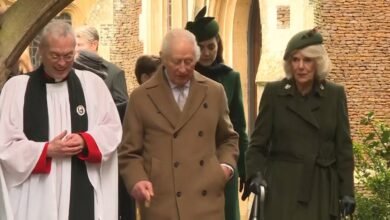Hong Kong: A decade of protest is now a defiant memory

The memories began rushing back as Kenneth strolled through Hong Kong’s Victoria Park, once a focal point for the city’s resistance to China.
As a child, Kenneth would buy calligraphy posters from pro-democracy politicians at the annual Lunar New Year fair.
Then there were the protest marches he joined as a teenager, that would always start here before winding their way through the city. When he was just 12, he began attending the park’s massive vigils for the Tiananmen massacre – a taboo in mainland China, but commemorated openly in Hong Kong.
Those vigils have ended now. The politicians’ stalls at the fair are gone, protests have been silenced and pro-democracy campaigners jailed. Kenneth feels his political coming-of-age – and Hong Kong’s – is being erased.
“People still carry on with life… but you can feel the change bit by bit,” said the former activis, who did not want to reveal his real name when he spoke to us.
“Our city’s character is disappearing.”
On the surface Hong Kong appears to be the same, its packed trams still rumbling down bustling streets, its vibrant neon-lit chaos undimmed.
But look closer and there are signs the city has changed – from the skyscrapers lighting up every night with exultations of China, the motherland, to the chatter of mainland Mandarin increasingly heard alongside Hong Kong’s native Cantonese.
It’s impossible to know how many of Hong Kong’s more than seven million people welcome Beijing’s grip. But hundreds of thousands have taken part in protests in the past decade since a pro-democracy movement erupted in 2014.
Not everyone supported it, but few would argue Beijing crushed it. As a turbulent decade draws to a close, hopes for a freer Hong Kong have withered.
China says it has steadied a volatile city. Hundreds have been jailed under a sweeping national security law (NSL), which also drove thousands of disillusioned and wary Hongkongers abroad, including activists who feared or fled arrest. Others, like Kenneth, have stayed and keep a low profile.
But in many of them lives the memory of a freer Hong Kong – a place they are fighting to remember in defiance of Beijing’s remaking of their city.
Source link



